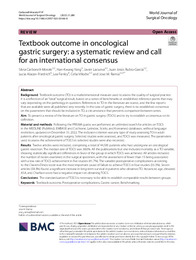Por favor, use este identificador para citar o enlazar este ítem:
https://hdl.handle.net/11000/38207Registro completo de metadatos
| Campo DC | Valor | Lengua/Idioma |
|---|---|---|
| dc.contributor.author | Carbonell-Morote, Silvia | - |
| dc.contributor.author | Yang, Han-Kwang | - |
| dc.contributor.author | Lacueva, Francisco Javier | - |
| dc.contributor.author | Rubio-García, Juan Jesús | - |
| dc.contributor.author | Alacan-Friedrich, Lucia | - |
| dc.contributor.author | Fierley, Lea | - |
| dc.contributor.author | Villodre, Celia | - |
| dc.contributor.author | Ramia, Jose M | - |
| dc.contributor.other | Departamentos de la UMH::Patología y Cirugía | es_ES |
| dc.date.accessioned | 2025-11-14T10:22:40Z | - |
| dc.date.available | 2025-11-14T10:22:40Z | - |
| dc.date.created | 2023-09 | - |
| dc.identifier.citation | World J Surg Oncol . 2023 Sep 12;21(1):288 | es_ES |
| dc.identifier.issn | 1477-7819 | - |
| dc.identifier.uri | https://hdl.handle.net/11000/38207 | - |
| dc.description.abstract | Background: Textbook outcome (TO) is a multidimensional measure used to assess the quality of surgical practice. It is a reflection of an "ideal" surgical result, based on a series of benchmarks or established reference points that may vary depending on the pathology in question. References to TO in the literature are scarce, and the few reports that are available were all published very recently. In the case of gastric surgery, there is no established consensus on the parameters that should be included in TO, a circumstance that prevents comparison between series. Aim: To present a review of the literature on TO in gastric surgery (TOGS) and to try to establish a consensus on its definition. Material and methods: Following the PRISMA guide, we performed an unlimited search for articles on TOGS in the MEDLINE (PubMed), EMBASE and Cochrane, Latindex, Scielo, and Koreamed databases, without language restriction, updated on December 31, 2022. The inclusion criterion was any type of study assessing TO in adult patients after oncological gastric surgery. Selected studies were assessed, and TOGS was measured. The parameters used to assess the achievement of TOGS in selected studies were also recorded.Results: Twelve articles were included, comprising a total of 44,581 patients who had undergone an oncological gastric resection. The median rate of TOGS was 38.6%. All the publications but one included mortality as a TO variable, showing statistically significant differences in favor of the group in which TOGS was achieved. All articles included the number of nodes examined in the surgical specimen, with the assessment of fewer than 15 being associated with a low rate of TOGS achievement in five studies (41.7%). The variable postoperative complications according to the Clavien-Dindo score was the most important cause of failure to achieve TOGS in four studies (33.3%). Seven articles (58.3%) found a significant increase in long-term survival in patients who obtained TO. Advanced age, elevated ASA, and Charlson score had a negative impact on obtaining TOGS.Conclusions: The standardization of TOGS is necessary to be able to establish comparable results between groups. | es_ES |
| dc.format | application/pdf | es_ES |
| dc.format.extent | 12 | es_ES |
| dc.language.iso | eng | es_ES |
| dc.publisher | BMC | es_ES |
| dc.rights | info:eu-repo/semantics/openAccess | es_ES |
| dc.rights | Attribution-NonCommercial-NoDerivatives 4.0 Internacional | * |
| dc.rights.uri | http://creativecommons.org/licenses/by-nc-nd/4.0/ | * |
| dc.subject | benchmarking | es_ES |
| dc.subject | gastric cancer | es_ES |
| dc.subject | postoperative complications | es_ES |
| dc.title | Textbook outcome in oncological gastric surgery: a systematic review and call for an international consensus | es_ES |
| dc.type | info:eu-repo/semantics/article | es_ES |
| dc.relation.publisherversion | 10.1186/s12957-023-03166-8 | es_ES |

Ver/Abrir:
Textbook outcome in oncological gastric surgery a systematic review and call for an international consensus.pdf
1,02 MB
Adobe PDF
Compartir:
 La licencia se describe como: Atribución-NonComercial-NoDerivada 4.0 Internacional.
La licencia se describe como: Atribución-NonComercial-NoDerivada 4.0 Internacional.
.png)